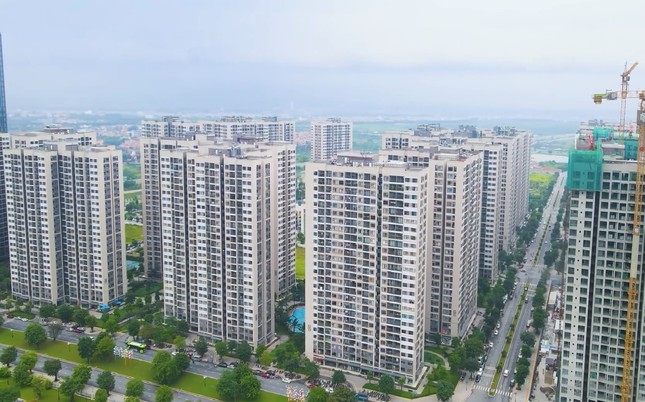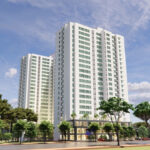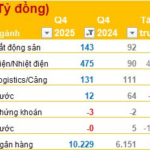Banks Compete with Incentives
VPbank has just announced loans for leasing and purchasing real estate in industrial parks and industrial clusters with interest rates as low as 0.6%/month. Notably, this bank accepts collateral in the form of leasing or purchasing contracts for real estate in industrial parks and industrial clusters, with a loan limit of up to 70% of the contract value and a loan term of up to 20 years.

Loan interest rates are low, but credit growth in the real estate sector is not promising.
BVBank also announced loan interest rates from 5%/year, applicable to loans for purchasing, constructing , and renovating houses. The spread after the promotional period is 2%/year. The floating interest rate is in the range of 9.5-10%/year.
Sacombank applies fixed interest rates of 6.5%/year for 6 months, 7%/year for 12 months, and 8%/year for 24 months for loans to purchase, construct, or renovate real estate. After the fixed period, the interest rate will be adjusted every 3 months…
The group of state-owned banks including BIDV, Vietinbank, Vietcombank, and Agribank applies loan interest rates from 5-7%/year, depending on the term.
Credit is Still Hard to Reach
From the perspective of businesses, Mr. Nguyen Quoc Hiep – Chairman of Toan Cau Real Estate Investment Joint Stock Company – said that the credit granting procedures for businesses and real estate projects are still quite complicated, with 2 steps taking an average of 2 months and the required documents include many unnecessary paperwork (such as minutes, resolutions of shareholders’ meetings that specifically mention the bank providing the loan , the loan project, and the loan amount). This has delayed businesses’ access to capital. In addition, most real estate projects are currently facing legal problems that have not been completely resolved. Therefore, although interest rates have decreased, it is very difficult for businesses to access credit capital.
The leader of a real estate business shared that for projects, the prerequisite for getting a loan is that the project must have investment approval. However, to obtain this approval document, the project must meet the condition of having legal land use rights. There are many projects that are effective and feasible, but cannot meet this requirement due to lack of land use rights. This regulation is very far from reality.
The possibility of accessing capital is also limited for investors and homebuyers at this time, despite the low interest rates
Ms. Minh Hang (in Hoang Mai district, Hanoi) said that she planned to sell her apartment for about 3 billion VND to buy a house on the ground floor. However, Ms. Hang was surprised to find out that the price of houses in the alleyways was over 5 billion VND. Thus, in order to buy a house, considering the savings her family had, Ms. Hang would still have to borrow nearly 2 billion VND.
“Currently, interest rates are very low, and banks not only fix them for 1 year, but even for the first 2-3 years. However, I don’t dare to buy now because house prices are high and the loan amount is large. If my income changes in the next few years, it will be difficult to bear the interest in the years to come. I cannot put all of my family’s money into a house,” said Ms. Hang.
As a professional real estate investor, Mr. Minh Quan (in Thanh Xuan district, Hanoi) also does not dare to borrow credit because in the current conditions, the Hanoi real estate market is still not active, and it is very difficult to buy and sell for a quick profit. When the interest rate promotion period ends but the house has not been sold, he will have to bear the debt and high interest rates.
In fact, up to now, many investors are still “holding” real estate and struggling to pay bank interest of over 10%/year for the past 2 years since the market froze.
This year, the target for credit growth for the entire system is about 15% and will be adjusted according to the actual developments and situation. According to the report of the State Bank of Vietnam, as of February 28, the outstanding credit for real estate business activities reached over 1.1 million billion VND.
In which, the outstanding credit for urban development investment projects and housing development projects is nearly 304,000 billion VND. The outstanding credit for office projects is over 42,300 billion VND. The outstanding loan balance for industrial park and export processing zone construction projects is nearly 78,350 billion VND. The outstanding loan balance for tourism, ecological, and resort projects is nearly 43,400 billion VND. The outstanding loan balance for restaurants and hotels is 60,502 billion VND. The outstanding loan balance for construction, renovation, and houses for sale and rent is over 121,000 billion VND. The outstanding loan balance for the purchase of land use rights is nearly 80,000 billion VND, while the outstanding loan balance for other real estate business investments is over 384,300 billion VND.
Mr. Hoang Hai – Director of the Department of Housing and Real Estate Market, Ministry of Construction – said that the disbursement of credit capital for real estate is still low. For the 120,000 billion VND credit package, only 28 localities have announced a list of 68 projects eligible for loans with a loan demand of over 30,000 billion VND. So far, banks have committed to providing credit for 15 projects with a total amount of approximately 7,000 billion VND. Of which, 8 social housing projects in 7 localities have been disbursed with a capital of approximately 640 billion VND.
Mr. Nguyen Thanh Tung – General Director of Vietcombank – said: “The difficult economic situation, decreased personal income, and sluggish real estate market have reduced the demand for home loans. The number of newly licensed projects is also smaller, leading to limited supply.
Commercial banks also expect real estate credit to start recovering from the second quarter. In 2023, real estate credit increased by 11.81%, accounting for 21.28% of the total outstanding debt of the economy, of which real estate business credit increased by 35.38%, and consumer credit for real estate increased by 1.08%.















